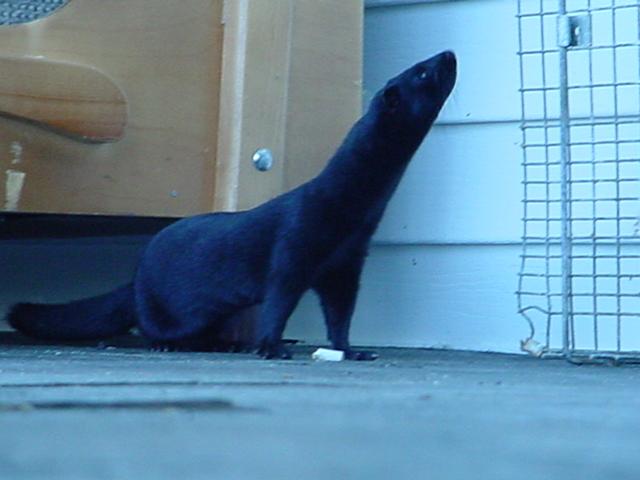American Mink
From Wikipedia, the free encyclopedia
[Photo] American Mink (Mustela vison) who escaped from a fur farm in Cox’s Cove, Newfoundland, Canada. Photo by Simon Fournier, 08-04-2006. Copyright (C) 2006 Simon Fournier
Permission is granted to copy, distribute and/or modify this document under the terms of the GNU Free Documentation License, Version 1.2 or any later version published by the Free Software Foundation; with no Invariant Sections, no Front-Cover Texts, and no Back-Cover Texts. A copy of the license is included in the section entitled "GNU Free Documentation License". |
The American Mink, Mustela vison, is a North American member of the Mustelidae family found in Alaska, Canada and most of the United States. They are also raised in fur farms for their lustrous fur, which is highly esteemed. Breeders have developed a range of colors from deep black to white.
Some have established themselves in the wild in Newfoundland, Europe and South America after escaping from fur farms. In Europe, tens of thousand were intentionally introduced by the Soviet Union over a period of several decades, to provide a new game animal for trappers, with disastrous results.
In recent years, animal rights activists have also released several thousands in their attacks on fur farms. Most of these released captive mink quickly died in the wild, preyed on by dogs or run over by cars.
The larger American male will mate with European Mink females earlier in the spring than the males of the same species; the offspring are not born, but the females do not then breed again that season. This has contributed to the decline of the European species. American Mink have also been implicated in the decline of the Water Vole in the United Kingdom and linked to the decline of water fowl across their range in Europe. They are now considered vermin in much of Europe and are hunted for the purpose of wildlife management.
Their long slim body is covered in glossy, thick dark brown or black fur with a white patch under the chin. They have short legs with partially webbed feet, which make them excellent swimmers.
They can be found in wooded areas and fields near streams and lakes. They dig burrows in river banks or take over dens abandoned by other animals.
They feed on small mammals, fish, crayfish, frogs and other amphibians, also sometimes eating birds, insects and earthworms. These animals are mainly active at night and do not hibernate. Their predators include coyotes, the Great Horned Owl, red foxes and wolves. They are also trapped for their fur. Their numbers have been reduced due to loss of habitat and the effects of pollution on their aquatic food supply.
They are usually solitary animals. Mating occurs during winter; males and females may have more than one partner. Females give birth to 3 or 4 young during early spring.
American mink in fiction
A mink which has escaped from a farm in England is the protagonist of Ewan Clarkson's novel Syla, whereas several mink in the same setting play the villainous invaders in A.R. Lloyd's Kine, where the hero is a weasel. The former is a naturalistic third-person narrative; the latter has some fantasy elements in that it features talking animals.
http://en.wikipedia.org/wiki/American_Mink
| The text in this page is based on the copyrighted Wikipedia article shown in above URL. It is used under the GNU Free Documentation License. You may redistribute it, verbatim or modified, providing that you comply with the terms of the GFDL. |
|

